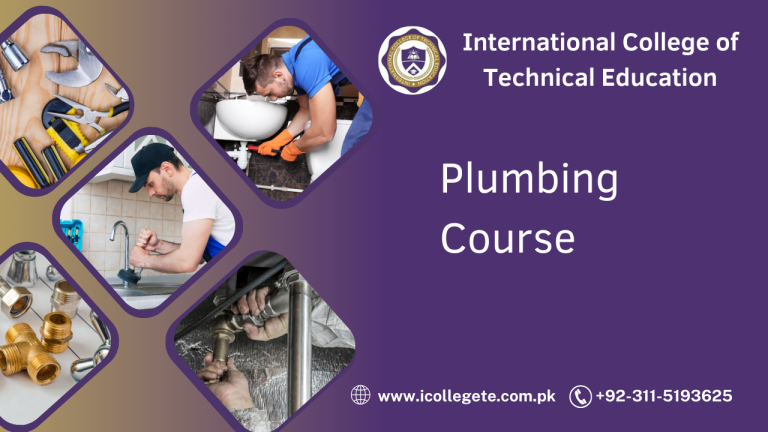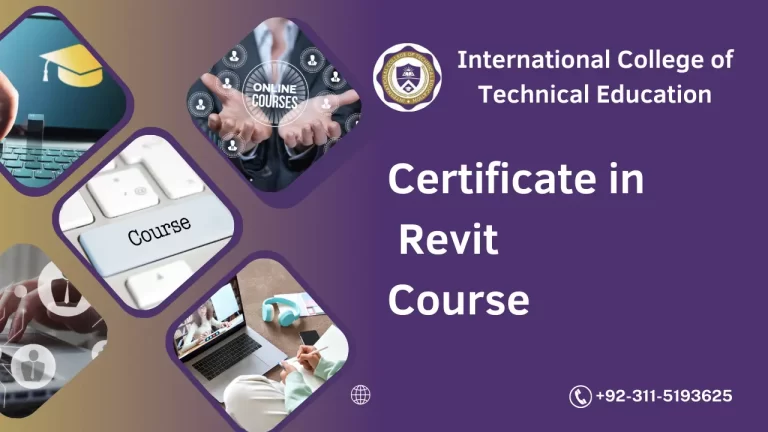The mechanical engineering field involves the design, analysis, and maintenance of mechanical systems and components that are critical to industries such as manufacturing, automotive, aerospace, and construction. As industries evolve, maintaining high-quality standards in mechanical processes becomes increasingly vital to ensuring the safety, reliability, and efficiency of mechanical systems. The Quality Control Mechanical Course in Sargodha is designed to provide students with the expertise required to ensure that mechanical products and systems meet the necessary quality standards.
This course equips individuals with the knowledge and skills to carry out quality assurance activities, manage inspection processes, and perform testing to maintain the mechanical integrity of components and systems. Whether you are new to mechanical engineering or seeking to enhance your qualifications, this course is an excellent opportunity to specialize in quality control within the mechanical field.
The Quality Control Mechanical Course in Sargodha introduces students to the concepts and methodologies used to ensure the quality of mechanical systems, components, and processes. Students will gain an understanding of how to assess, monitor, and improve the quality of mechanical engineering projects through effective testing, inspections, and adherence to industry standards.
This course provides a blend of theoretical learning and practical application, ensuring students can manage quality control processes in the manufacturing and maintenance of mechanical systems. By the end of the course, students will be able to apply various quality control techniques, utilize tools for inspection and testing, and work effectively to maintain mechanical system integrity.
Course Overview
The Quality Control Mechanical Course focuses on the principles, processes, and tools involved in maintaining the quality of mechanical systems. It covers various topics, including materials testing, inspection techniques, non-destructive testing (NDT), process control, and compliance with national and international standards. The course also introduces students to advanced concepts in quality management systems, enabling them to contribute effectively to the quality control efforts in mechanical engineering industries.
This comprehensive course is designed to ensure that students are well-prepared to oversee quality control functions in mechanical manufacturing, product development, and maintenance activities. Through practical training and case studies, students will learn how to prevent defects, troubleshoot problems, and optimize processes to meet the highest quality standards.
Study Units
The Quality Control Mechanical Course in Sargodha includes the following study units:
- Introduction to Quality Control in Mechanical Engineering
This unit covers the fundamentals of quality control in mechanical systems, highlighting the importance of maintaining high-quality standards to ensure safety, reliability, and efficiency. - Mechanical Components and Materials
In this unit, students learn about the different materials used in mechanical systems, such as metals, alloys, plastics, and composites. The unit also covers material properties and the importance of selecting the right materials for specific mechanical applications. - Mechanical Testing Methods
This unit delves into the various testing methods used to evaluate the quality of mechanical components. It includes techniques such as tensile testing, hardness testing, fatigue testing, and impact testing, enabling students to assess material strength, durability, and performance. - Inspection Techniques for Mechanical Systems
Students will learn about the different inspection methods used to assess the quality of mechanical systems. This includes visual inspections, dimensional inspections, and advanced methods like ultrasonic testing (UT), radiographic testing (RT), and eddy current testing (ECT). - Non-Destructive Testing (NDT)
Non-destructive testing is essential for evaluating the integrity of mechanical components without causing any damage. This unit introduces students to various NDT methods, such as ultrasonic, magnetic particle, and dye penetrant testing, and their applications in mechanical engineering. - Quality Management Systems in Mechanical Engineering
This unit covers the principles of quality management systems (QMS) and their application in mechanical engineering. Students will learn about ISO 9001 standards, Six Sigma, and lean manufacturing principles, which help improve efficiency and reduce defects in mechanical processes. - Process Control and Optimization
Students will learn about the methods used to control and optimize mechanical processes, ensuring consistent product quality. This includes process analysis, control charts, and statistical methods used to monitor and improve production processes. - Safety Standards and Procedures in Mechanical Systems
Safety is a priority in mechanical engineering. This unit focuses on the safety standards and procedures that should be followed when working with mechanical systems. Students will learn about risk assessment, hazard identification, and safety protocols to ensure a safe working environment. - Documentation and Reporting in Quality Control
Proper documentation and reporting are essential in quality control. This unit teaches students how to record inspection results, testing data, and compliance reports, ensuring clear communication among team members, clients, and regulatory authorities.
Learning Outcomes
Upon completing the Quality Control Mechanical Course in Sargodha, students will be able to:
- Understand the principles of quality control in mechanical systems and their importance in ensuring safety and performance.
- Identify and evaluate mechanical materials and components for quality and compliance with standards.
- Use various mechanical testing methods to assess material properties and the performance of mechanical components.
- Perform inspections on mechanical systems using different techniques, including non-destructive testing methods.
- Apply quality management principles, including ISO standards and Six Sigma, to optimize mechanical processes and reduce defects.
- Implement process control techniques to monitor and improve production processes, ensuring consistent product quality.
- Apply safety standards and procedures in mechanical engineering practices to prevent accidents and hazards.
- Maintain proper documentation and reporting of quality control activities in mechanical systems.
Course Benefits
- Practical Skills: The course provides practical training in quality control methods, giving students the hands-on experience needed to handle real-world quality assurance tasks.
- Comprehensive Knowledge: Students will gain in-depth knowledge of mechanical testing, inspection techniques, and quality management systems, enabling them to maintain the highest standards in mechanical engineering.
- Industry-Relevant Training: The course is designed to meet the needs of industries that rely on mechanical systems, ensuring that graduates are well-prepared to enter the workforce and make an immediate impact.
- Career Advancement: Quality control is a critical function in mechanical engineering. Completing this course can improve job prospects, salary potential, and opportunities for career advancement in the mechanical engineering field.
- Enhanced Problem-Solving Abilities: Students will develop strong analytical and problem-solving skills that will enable them to identify and resolve quality issues efficiently in mechanical systems.
- International Standards: The course covers international quality standards, ensuring that students are equipped with skills that are globally recognized and applicable.
Who Is This Course For?
The Quality Control Mechanical Course in Sargodha is ideal for:
- Aspiring Mechanical Engineers: Those who wish to specialize in quality control and ensure the reliability and safety of mechanical systems and components.
- Mechanical Technicians: Individuals already working in mechanical roles who want to enhance their knowledge of quality control and improve their career prospects.
- Manufacturing Professionals: Workers in manufacturing industries looking to improve their understanding of quality assurance processes and optimize mechanical production.
- Maintenance Engineers: Engineers responsible for the ongoing maintenance of mechanical systems who want to improve their ability to assess and maintain system quality.
- Project Managers: Managers overseeing mechanical projects who want to integrate quality control practices into their project management strategies.
- Safety Engineers: Professionals working in safety management within the mechanical field who wish to gain expertise in quality control and risk management.
Future Progression
Graduates of the Quality Control Mechanical Course can pursue a variety of career paths, including:
- Quality Control Inspector: Inspect mechanical components and systems to ensure compliance with safety standards and specifications.
- Mechanical Testing Engineer: Perform and supervise mechanical tests to assess the strength, durability, and performance of materials and components.
- Process Control Engineer: Manage the control of mechanical production processes, ensuring that they remain within the desired quality parameters.
- Quality Assurance Manager: Oversee quality control operations within manufacturing or construction projects, implementing quality management systems and improving overall efficiency.
- Maintenance Manager: Oversee the maintenance of mechanical systems, ensuring that they continue to operate at optimal levels of quality and safety.
- Consultant: Work as an independent consultant, advising companies on how to improve their mechanical quality control practices and achieve better results.
Additionally, graduates can pursue certifications in specialized areas such as ISO 9001, Six Sigma, or lean manufacturing, which will further enhance their expertise and open doors to more advanced roles in quality control.
The Quality Control Mechanical Course in Sargodha provides essential skills for ensuring that mechanical systems meet high standards of safety, reliability, and performance. Whether you’re looking to enter the field of mechanical engineering or enhance your existing career, this course offers comprehensive training to help you succeed. With practical skills, industry knowledge, and an emphasis on quality control techniques, graduates will be well-prepared to contribute to the success of mechanical projects across various industries.







